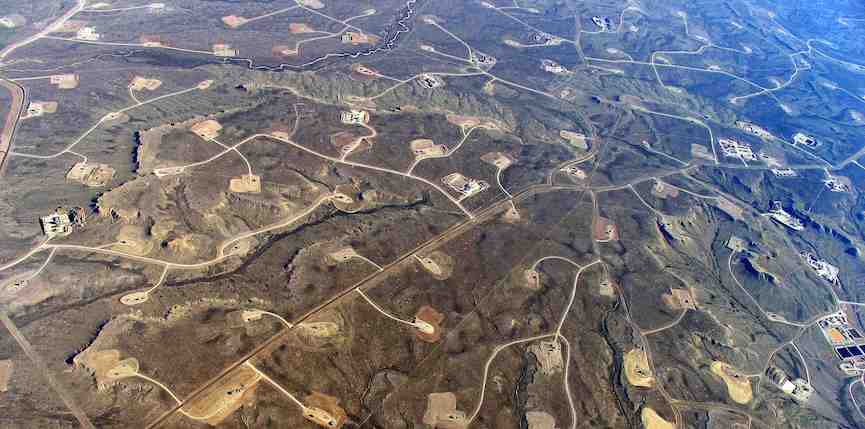Earthquakes, methane emissions, scarred landscapes, water depletion and contamination are just a few known effects of hydraulic fracturing, or fracking.
There’s also a lot we don’t know — but that hasn’t stopped governments and industry from throwing caution to the wind and fracking as if there’s no tomorrow. Fracking wells in Saskatchewan multiplied a hundredfold in 10 years, from 75 in 2004 to 7,500 by 2015. Alberta, which produces 72 per cent of Canada’s marketable natural gas, has 170,000 fracked wells!
Almost all our marketable gas is produced in the western provinces, but Natural Resources Canada notes, “Ontario, Quebec, New Brunswick, Nova Scotia, and the territories” all have shale gas resources.
Despite a commitment to climate action, B.C., which now produces one-quarter of Canada’s natural gas, is pinning its economic hopes on rapidly expanding its fracking industry, offering tax breaks and subsidies. Although the previous B.C. government’s vision of a windfall from more than 20 liquefied natural gas projects never materialized, mainly because of poor market conditions, the province still has its sights set on Shell’s $40-billion LNG project at Kitimat, as well as the smaller Woodfibre project near Squamish and FortisBC’s recently expanded Tilbury LNG facility in Delta.
With easily accessible gas and oil deposits becoming depleted, companies have turned to fracking to extract it from shale formations. This involves drilling deep, often horizontal wells and pumping large amounts of pressurized water, sand and chemicals into them to fracture rock and release gas or oil. Gas is piped to LNG export plants where it is cooled, compressed and liquefied before being shipped, requiring enormous amounts of energy. (Some speculate the Site C dam’s purpose is to provide the LNG industry with energy and water.) Almost all B.C.’s natural gas is fracked.
A year ago, the B.C. government appointed a science panel to look into issues around fracking, including seismic activity and impacts on water resources.
The panel’s report, released in February, concluded that we don’t know enough about impacts. Panel members said they couldn’t quantify risks to human and environmental health or cumulative effects “because there are too few data to assess risk.” They also wrote that rapid shale gas development in northeastern B.C. “has made it difficult to assure that risks are being adequately managed at every step” and that “insufficient evidence was provided to the Panel to assess the degree of compliance and enforcement of regulations.”
Much of the report details the lack of data or information on everything from water use and impacts on ground and surface water to methane emissions and contamination from radioactive materials.
We know fracking can cause earthquakes. A 2016 study found 90 to 95 per cent of magnitude three or greater earthquakes along the B.C.-Alberta border were fracking-related. We also know it uses enormous amounts of water, is linked to drinking water contamination and has massive impacts on land and habitat.
It’s also contributing to climate change. Despite proponents’ claims that fracked gas is a “clean” or “transition” fuel that will help fight climate disruption, research shows the industry’s methane emissions make it as bad as coal in some cases.
Although methane doesn’t stay in the atmosphere for as long as carbon dioxide, it traps 84 times as much heat over a 20-year time frame and is thought to be responsible for 25 per cent of already observed changes to Earth’s climate. A 2017 David Suzuki Foundation and St. Francis Xavier University study found fugitive methane emissions just from natural gas drilling and production in B.C. were at least 2.5 times higher than industry and government have reported for the entire oil and gas sector, including production, processing and transport.
We live in an era of tough choices. Scientists worldwide have amassed overwhelming evidence that we have little time to shift from excessive fossil fuel use if we are to avert climate chaos. But our economic systems demand constant growth and resource exploitation in the name of profits and job creation, regardless of consequences. As easy sources of coal, oil and gas become depleted, industry and governments are moving as quickly as possible to exploit “unconventional” reserves through oilsands extraction, deep-sea drilling, Arctic exploration and fracking.
This is neither sustainable nor rational.
David Suzuki is a scientist, broadcaster, author and co-founder of the David Suzuki Foundation. Written with contributions from David Suzuki Foundation Senior Editor Ian Hanington.
Learn more at https://davidsuzuki.org/.
Image: SFU/Flickr
Help make rabble sustainable. Please consider supporting our work with a monthly donation. Support rabble.ca today for as little as $1 per month!




